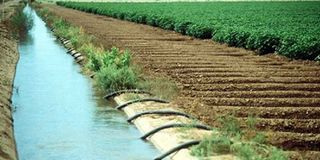Report: Rivers remain big source of irrigation water

What you need to know:
The annual agriculture report by the National Bureau of Statistics (NBS) shows that in 2017 at least 36.2 per cent of irrigation farmers used rivers as their source of water.
Dar es Salaam. Rivers remain the major source of irrigation for agriculture operators in the country, a report has revealed.
The annual agriculture report by the National Bureau of Statistics (NBS) shows that in 2017 at least 36.2 per cent of irrigation farmers used rivers as their source of water.
This means in every 100 farmers conducting irrigation farming at least 36 were dependent on rivers.
The report revealed that other sources such as wells, tap water, dams and lakes were used to the 2.5 per cent of the 15,028,841 total planted areas in the country, which is under irrigation. And operators who were using irrigation for the particular year totalled 437,112.
Use of rivers is followed by tap water with 125,541(28.2 per cent) and wells 112,618 operators (25.3 per cent). Only 21,259 (4.8 per cent) used dams and 20,452 (4.6 per cent) used lakes.
But this will pose a challenge for the agriculture sector development as rivers are not always sustainable sources of water.
Experience shows that in Tanzania rivers have dramatic seasonal variability, which is reflected by rainfall patterns.
Weather conditions problems such as global warming and greenhouse effect, among others, affect the volume of water in the country as there are seasons where rivers are totally dry.
Another issue is the restriction put on farmers to cultivate near water bodies such as rivers. For example, mid last year Vice President Samia Suluhu Hassan visited the Mtera dam, which produces hydroelectric power from water flowing from Ruaha River.
The Vice President warned farmers that environmental degradation resulting of the from agricultural activities affected the volume of water hence production of hydroelectric power.
For his part, a farm owner who uses irrigation by tap water, Mr Sebastian Victor, called on the government to ensure it formulated policies, which would ensure availability of sustainable sources for irrigation.
“Irrigation is an important alternative to dependence on rainfall for farming activities; this practice ensures availability of crops in absence of rainfall, there should be favourable policies to support it,” he said.




